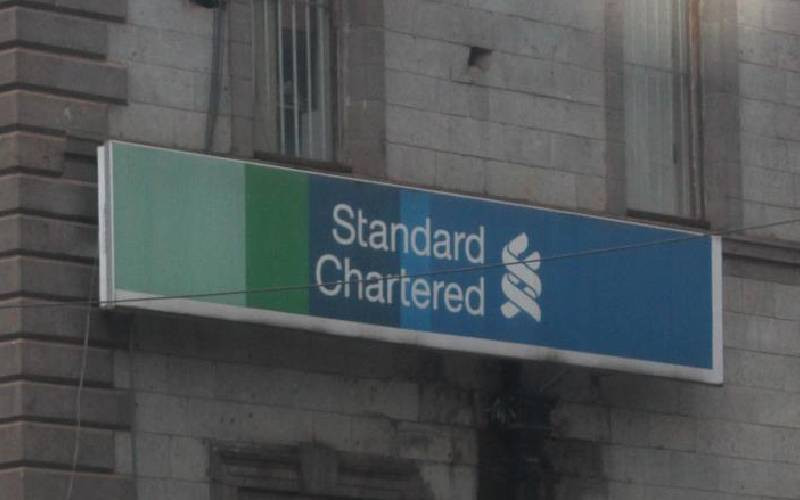Commercial banks in the country are staring at the biggest civil lawsuit in Kenya’s history, which may see many small banks in the country go under.
This follows one bank customer’s move to sue her bank, Standard Chartered, for deductions on her account, prompting a 10-year legal battle that industry players seemed to have all but forgotten.
Last year, however, the High Court reinstated the case, and today, the plaintiff, Ms Rose Wanjiru, through a newspaper advertisement, has invited the public to be enjoined in the suit as interested parties.
If the court rules that Standard Chartered, and by extension other banks, revised their charges without the Finance ministry’s approval, the country’s 43 commercial banks could be forced to refund the billions of dollars deducted from account holders over the last 25 years.
Further, Treasury may be forced to refund the corporate tax collected from the institutions over the same period.
Business Beat spoke to Mr Gichuki Waigwa, the lawyer at the centre of the suit, over the history of the court battle, why it has taken 10 years to get to this point and its potential economic impact.
Tell us the genesis and scale of this case.
The case came about in mid-2003 when Rose Wanjiru, who is the plaintiff, looked at her banking slip and noticed that the charges had been increasing. She did not make much of it, but she told me about it and mentioned that she found the increments strange.
That is when I told her that it was actually illegal under Section 44 of the Banking Act, which states that no institution shall increase its rate of banking or other charges except with the prior approval of the Finance minister.
We filed a suit on July 22, 2003, where we named Standard Chartered, the Kenya Bankers Association, which represents the country’s 43 banks, and the Central Bank of Kenya for negligence. This is my biggest case in 23 years of practising law, and because of the amounts of money at stake, it is also the biggest case in the history of the republic.
What, exactly, are the stakes involved in this case for the parties involved?
The suit enjoins all 43 commercial banks in the country and that means everyone who has an account with a bank and feels that they have been aggrieved by irregular bank charges one way or another can be a part of it. We are talking about millions of individual account holders, corporate customers, mortgage holders and real estate developers. The suit goes back to November 1, 1989, which is the date the Banking Act was instituted.
It is my opinion that commercial banks in the country have been acting with a lot of impunity, and it is not just one bank that has contravened Section 44 of the Banking Act, but all of them.
What we are seeking here is an admission that Section 44 has been contravened and that might be the reason banks post super profits when other sectors are struggling. This is a David and Goliath fight, and you can tell by the way banks are treating the suit with contempt.
What do you mean the banks are treating the suit with contempt? Surely they know what is at stake here.
Stay informed. Subscribe to our newsletter
They may know what is at stake ... this is not the first time that this matter is coming to their attention. I have written to them three times in the past to initiate negotiations or an out-of-court settlement, but have received no reply.
In 2003, former Finance minister David Mwiraria, in his Budget speech, stated that banks had breached Section 44 and sought to enforce it but failed. His successor, Mr Amos Kimunya, and the Cabinet tried to have Parliament delete Section 44 of the Banking Act, but Parliament rejected the amendment.
If the court rules in our favour, smaller banks will definitely close down because the costs of the refunds will be too much on them. Larger multinationals might be bailed out by their subsidiaries and parent companies, but the dent on their finances will still be massive.
That is if you win. What happens if you lose?
We don’t see ourselves losing. In any case, we have been fighting this battle for the last 10 years and even when it was struck out back in 2004, we paid the costs. We appreciate what is at stake here and are not afraid to go the long haul.
[email protected]
 The Standard Group Plc is a
multi-media organization with investments in media platforms spanning newspaper
print operations, television, radio broadcasting, digital and online services. The
Standard Group is recognized as a leading multi-media house in Kenya with a key
influence in matters of national and international interest.
The Standard Group Plc is a
multi-media organization with investments in media platforms spanning newspaper
print operations, television, radio broadcasting, digital and online services. The
Standard Group is recognized as a leading multi-media house in Kenya with a key
influence in matters of national and international interest.
 The Standard Group Plc is a
multi-media organization with investments in media platforms spanning newspaper
print operations, television, radio broadcasting, digital and online services. The
Standard Group is recognized as a leading multi-media house in Kenya with a key
influence in matters of national and international interest.
The Standard Group Plc is a
multi-media organization with investments in media platforms spanning newspaper
print operations, television, radio broadcasting, digital and online services. The
Standard Group is recognized as a leading multi-media house in Kenya with a key
influence in matters of national and international interest.









